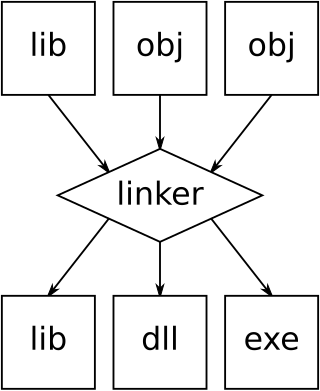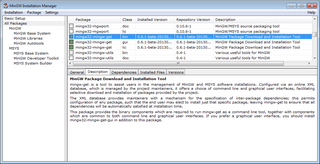This article provides insufficient context for those unfamiliar with the subject.(July 2018) |
readelf is a program for displaying various information about object files on Unix-like systems, similar to objdump. It is part of the GNU binutils.
This article provides insufficient context for those unfamiliar with the subject.(July 2018) |
readelf is a program for displaying various information about object files on Unix-like systems, similar to objdump. It is part of the GNU binutils.
This section's tone or style may not reflect the encyclopedic tone used on Wikipedia.(July 2024) |
Both programs are capable of displaying the contents of ELF format files. objdump sees an ELF file through a BFD filter. If BFD has a bug where it disagrees about a machine constant in e_flags, then the odds are good that it will remain internally consistent. The linker sees it the BFD way, objdump sees it the BFD way, GAS sees it the BFD way. There was need for a tool to go find out what the file actually says.
This is why the readelf program does not link against the BFD library - it exists as an independent program to help verify the correct working of BFD.
There is also the case that readelf can provide more information about an ELF file than is provided by objdump. In particular it can display DWARF debugging information which (at the moment) objdump cannot. [1]
The following command displays the contents of the file's dynamic section (to examine the shared library dependencies and rpath): [2]
$ readelf-d<filename> 
In computing, the Executable and Linkable Format is a common standard file format for executable files, object code, shared libraries, and core dumps. First published in the specification for the application binary interface (ABI) of the Unix operating system version named System V Release 4 (SVR4), and later in the Tool Interface Standard, it was quickly accepted among different vendors of Unix systems. In 1999, it was chosen as the standard binary file format for Unix and Unix-like systems on x86 processors by the 86open project.

In computing, a linker or link editor is a computer system program that takes one or more object files and combines them into a single executable file, library file, or another "object" file.
In computing, a core dump, memory dump, crash dump, storage dump, system dump, or ABEND dump consists of the recorded state of the working memory of a computer program at a specific time, generally when the program has crashed or otherwise terminated abnormally. In practice, other key pieces of program state are usually dumped at the same time, including the processor registers, which may include the program counter and stack pointer, memory management information, and other processor and operating system flags and information. A snapshot dump is a memory dump requested by the computer operator or by the running program, after which the program is able to continue. Core dumps are often used to assist in diagnosing and debugging errors in computer programs.
A disassembler is a computer program that translates machine language into assembly language—the inverse operation to that of an assembler. Disassembly, the output of a disassembler, is often formatted for human-readability rather than suitability for input to an assembler, making it principally a reverse-engineering tool. Common uses of disassemblers include analyzing high-level programming language compilers output and their optimizations, recovering source code of a program whose original source was lost, malware analysis, modifying software, and software cracking.
The Portable Executable (PE) format is a file format for executables, object code, DLLs and others used in 32-bit and 64-bit versions of Windows operating systems, and in UEFI environments. The PE format is a data structure that encapsulates the information necessary for the Windows OS loader to manage the wrapped executable code. This includes dynamic library references for linking, API export and import tables, resource management data and thread-local storage (TLS) data. On NT operating systems, the PE format is used for EXE, DLL, SYS, MUI and other file types. The Unified Extensible Firmware Interface (UEFI) specification states that PE is the standard executable format in EFI environments.
An object file is a file that contains machine code or bytecode, as well as other data and metadata, generated by a compiler or assembler from source code during the compilation or assembly process. The machine code that is generated is known as object code.
The Binary File Descriptor library (BFD) is the GNU Project's main mechanism for the portable manipulation of object files in a variety of formats. As of 2003, it supports approximately 50 file formats and 25 instruction set architectures.

MinGW, formerly mingw32, is a free and open source software development environment to create Microsoft Windows applications.
The archiver, also known simply as ar, is a Unix utility that maintains groups of files as a single archive file. Today, ar is generally used only to create and update static library files that the link editor or linker uses and for generating .deb packages for the Debian family; it can be used to create archives for any purpose, but has been largely replaced by tar for purposes other than static libraries. An implementation of ar is included as one of the GNU Binutils.
Microsoft WinHelp is a proprietary format for online help files that can be displayed by the Microsoft Help browser winhelp.exe or winhlp32.exe. The file format is based on Rich Text Format (RTF). It remained a popular Help platform from Windows 3.0 through Windows XP. WinHelp was removed in Windows Vista purportedly to discourage software developers from using the obsolete format and encourage use of newer help formats. Support for WinHelp files would eventually be removed entirely in Windows 10.
Dependency Walker or depends.exe is a free program for Microsoft Windows used to list the imported and exported functions of a portable executable file. It also displays a recursive tree of all the dependencies of the executable file. Dependency Walker was included in Microsoft Visual Studio until Visual Studio 2005 and Windows XP SP2 support tools. The latest version v2.2.10011 is not available on dependencywalker.com website but is included in the Windows Driver Kit v10.
In NeXTSTEP, OPENSTEP, and their lineal descendants macOS, iOS, iPadOS, tvOS, and watchOS, and in GNUstep, a bundle is a file directory with a defined structure and file extension, allowing related files to be grouped together as a conceptually single item.
A dynamic-link library (DLL) is a shared library in the Microsoft Windows or OS/2 operating system.
objdump is a command-line program for displaying various information about object files on Unix-like operating systems. For instance, it can be used as a disassembler to view an executable in assembly form. It is part of the GNU Binutils for fine-grained control over executables and other binary data. objdump uses the BFD library to read the contents of object files. Similar utilities are Borland TDUMP, Microsoft DUMPBIN and readelf.

The GNU Binary Utilities, or binutils, is a collection of programming tools maintained by the GNU Project for working with executable code including assembly, linking and many other development operations.
A dump analyzer is a programming tool which is used for understanding a machine readable core dump.
In Unix and Unix-like operating systems, a soname is a field of data in a shared object file. The soname is a string, which is used as a "logical name" describing the functionality of the object. Typically, that name is equal to the filename of the library, or to a prefix thereof, e.g. libc.so.6.

In software engineering, gold is a linker for ELF files. It became an official GNU package and was added to binutils in March 2008 and first released in binutils version 2.19. gold was developed by Ian Lance Taylor and a small team at Google. The motivation for writing gold was to make a linker that is faster than the GNU linker, especially for large applications coded in C++.
A file format is a standard way that information is encoded for storage in a computer file. It specifies how bits are used to encode information in a digital storage medium. File formats may be either proprietary or free.
Mingw-w64 is a free and open-source suite of developments tools that generate Portable Executable (PE) binaries for Microsoft Windows. It was forked in 2005–2010 from MinGW.